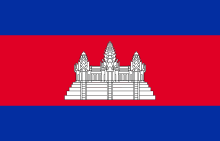East Timor is a relatively new country. As one of the world's poorest countries, athletic activities are limited at the professional level.

The Southeast Asian Games, also known as the SEA Games, is a biennial multi-sport event involving participants from the current 11 countries of Southeast Asia. The games are under the regulation of the Southeast Asian Games Federation with supervision by the International Olympic Committee (IOC) and the Olympic Council of Asia (OCA).

The 1959 Southeast Asian Peninsular Games, officially known as the 1st Southeast Asian Peninsular Games, was the first and inaugural edition of the biennial multi-sport event for Southeast Asian athletes, organised by the SEAP Games Federation. It was held in Bangkok, Thailand from 12 to 17 December 1959 with 12 sports featured in the games. Cambodia, one of the six founding members of the SEAP Games Federation, did not compete at the inaugural edition. For the first time and first among all Southeast Asian nations, Thailand hosted the Southeast Asian Peninsular Games, which later known as the Southeast Asian Games. The games was opened and closed by Bhumibol Adulyadej, the King of Thailand at the Suphachalasai Stadium. The final medal tally was led by host Thailand, followed by its neighbouring countries, Burma and Malaya.

The 1961 Southeast Asian Peninsular Games, officially known as the 2nd Southeast Asian Peninsular Games, was a Southeast Asian multi-sport event held in Rangoon, Burma from 11 to 16 December 1961 with 13 sports featured in the games. This was the first time all six founding members of the SEAP Games Federation competed in the biennial sports festival and the first time Myanmar, then known as Burma hosted the games. Burma, later known as Myanmar is the second country to host the Southeast Asian Peninsular Games, which later known as the Southeast Asian Games after Thailand. The games was opened and closed by Win Maung, the President of Burma at the Bogyoke Aung San Stadium. The final medal tally was led by host Burma, followed by Thailand and Malaya.

The 1965 Southeast Asian Peninsular Games, officially known as the 3rd Southeast Asian Peninsular Games, was a Southeast Asian multi-sport event held in Kuala Lumpur, Malaysia, from 14 to 21 December 1965 with 14 sports featured in the games. Originally to be hosted by Laos, the third edition of the games was hosted by Malaysia after the former was not able to honour its hosting commitment citing financial difficulties and would later known to have hosted the 2009 Southeast Asian Games decades later. Two years earlier, the third SEAP Games was cancelled as Cambodia pulled out of hosting the event due to internal strife. This was the first time Malaysia host the games. Malaysia is the third country to host the Southeast Asian Peninsular Games, which later known as the Southeast Asian Games after Thailand and Myanmar, then Burma. The games was opened and closed by Ismail Nasiruddin, the King of Malaysia at the Stadium Merdeka. The final medal tally was led by Thailand followed by host Malaysia and Singapore.

The 1967 Southeast Asian Peninsular Games, officially known as the 4th Southeast Asian Peninsular Games, was a Southeast Asian multi-sport event held in Bangkok, Thailand from 9 to 16 December 1967 with 16 sports featured in the games. Cambodia once again declined to host this edition of the games, as it did in 1963. This was Thailand's second time hosting the Southeast Asian Games, and its first time since the 1959 inaugural games. The games was opened and closed by Bhumibol Adulyadej, the King of Thailand at the Suphachalasai Stadium. The final medal tally was led by host Thailand, followed by Singapore and Malaysia.
The 1983 Southeast Asian Games, officially known as the 12th Southeast Asian Games, or informally Singapore 1983, was a Southeast Asian multi-sport event held in Singapore from 28 May to 6 June 1983. Scheduled to be hosted by Brunei in accordance to the renewed alphabetical rotation of hosting duties, the 1983 SEA Games were offered to be hosted by Singapore as Brunei prepared for its forthcoming independence from the United Kingdom. The games also marked the return of Cambodia, as People's Republic of Kampuchea after an 8-year-long absence since the Khmer Rouge seized power in 1975.

The 1989 Southeast Asian Games, officially known as the 15th Southeast Asian Games, was a multi-sport event held in Kuala Lumpur, Malaysia from 20 to 31 August 1989 with 25 sports featured in the games. It was officially opened by 9th Yang di-Pertuan Agong, Sultan Azlan Shah. Although Cambodia did not participate, Laos returned to compete for the first time under the new federation name in this edition of the games, while Vietnam fields their own delegation to the event for the first time as a unified country.
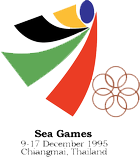
The 1995 Southeast Asian Games, officially known as the 18th Southeast Asian Games, was a Southeast Asian multi-sport event held in Chiang Mai, Thailand from 9 to 17 December 1995. It was the first time that a non-capital city hosted the biennial sports event. Chiang Mai is the second Thai city to host the Southeast Asian Games after Bangkok. The games were opened and closed by Vajiralongkorn, the then-Crown Prince of Thailand. With the return of Cambodia, all ten members of the federation were present to compete in the SEA Games for the first time.
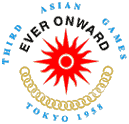
The 1958 Asian Games, officially the Third Asian Games and commonly known as Tokyo 1958, was a multi-sport event held in Tokyo, Japan, from 24 May to 1 June 1958. It was governed by the Asian Games Federation. A total of 1,820 athletes representing 20 Asian National Olympic Committees (NOCs) participated in the Games. The program featured competitions in 13 different sports encompassing 97 events, including four non-Olympic sports, judo, table tennis, tennis and volleyball. Four of these competition sports – field hockey, table tennis, tennis and volleyball – were introduced for the first time in the Asian Games.

The 2013 Southeast Asian Games, officially known as the 27th Southeast Asian Games, or the 27th SEA Games, and commonly known as Naypyitaw 2013, was a Southeast Asian multi-sport event took place in Nay Pyi Taw, Myanmar from 11 to 22 December 2013, Around 4730 athletes from 11 participating nations competed at the games, which featured 460 events in 34 sports. The games were held from 11 to 22 December 2013.

Philippines is a member of the South East Asian Zone of the Olympic Council of Asia (OCA), and has participated in the Asian Games since their inception in 1951. The Philippine Olympic Committee, established in 1911, and recognized in 1929 by the International Olympic Committee, is the National Olympic Committee for Philippines.

Cambodia, which is represented by the National Olympic Committee of Cambodia (NOCC), competed at the 2012 Summer Olympics in London from 27 July to 12 August 2012. Six Cambodian athletes competed in the disciplines of track and field athletics, swimming, taekwondo, and judo.
Athletics competitions at the 2015 Southeast Asian Games were held at the National Stadium, East Coast Park and Kallang Practice Track in Singapore from 6 to 12 June. A total of 46 athletics events are featured at the 28th SEA Games, divided evenly between the sexes. The marathon started and finished in the stadium and had a route in the surrounding area including the East Coast Park, Marina Bay and the Gardens by the Bay.
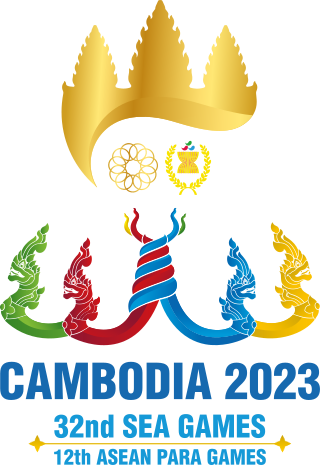
The 2023 Southeast Asian Games, commonly known as the 32nd Southeast Asian Games, or the 32nd SEA Games, and commonly known as Cambodia 2023, is the 32nd edition of the Southeast Asian Games, a biennial sports multi-sport event which is currently held from 5 to 17 May 2023 in Phnom Penh, Cambodia.
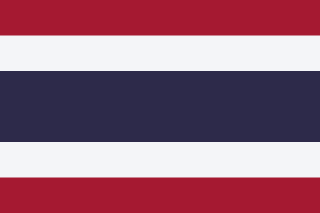
Thailand started sending athletes to the Southeast Asian Games in 1959 as a Founding member of the Southeast Asian Games Federation (SEAGF) alongside Burma, Kampuchea, Laos, Malaya, and the Republic of Vietnam. Thailand first competed in the Southeast Asian Peninsular Games (SEAPG) from its namesake of "Peninsular" meaning the Peninsular nations of Southeast Asia would be competing in the said games. There were 8 events held as a Southeast Asian Peninsular Games, 3 of which were held in Thailand. The 1963 edition of the games that would have been hosted by Cambodia was cancelled due to domestic political situation within the nation.
Table tennis at the 2021 Southeast Asian Games took place at Hải Dương Gymnasium, in Hải Dương, Vietnam from 13 to 20 May 2022.

Singapore started sending athletes to the Southeast Asian Games in 1959 as a founding member of the Southeast Asian Games Federation alongside Burma, Kampuchea, Laos, Malaya, and the Republic of Vietnam. Thailand first competed in the Southeast Asian Peninsular Games from its namesake of "peninsular" meaning the peninsular nations of Southeast Asia would be competing in the said games. There were 8 events held as a Southeast Asian Peninsular Games, 3 of which were held in Thailand. The 1963 edition of the games that would have been hosted by Cambodia was cancelled due to domestic political situation within the nation.
Table tennis at the 1999 Southeast Asian Games is being held in the Menglait Sports Hall, in Bandar Seri Begawan, Brunei from 8 to 15 August 1999.

The Cambodia national badminton team represents Cambodia in international badminton team competitions. It is controlled by the Cambodia Badminton Federation. Cambodia have never competed in any BWF organized team tournaments.
